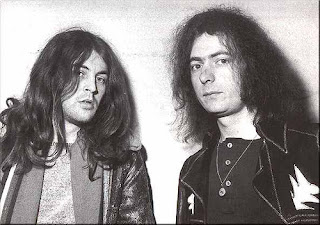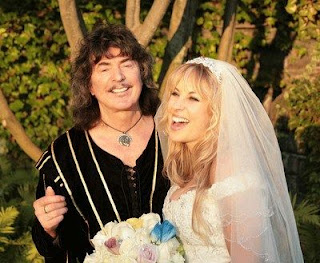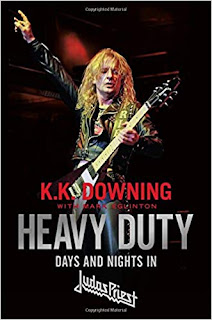I look at him as being a musician who pulls pranks just to kill the boredom of being on tour. I used to think he was arrogant. After seeing a few interviews here and there, I've come to realize, he's not arrogant. He's probably just tired of all the drama that surrounded him during his days in Deep Purple and Rainbow. All the fighting he did with people like Ian Gillan or Ronnie James Dio would be enough to make anyone lose their hair from stress or even bite your tongue to keep you from speaking your mind. He, more or less, has a jaded view on Deep Purple.
This book is very interesting. Everyone pretty much knows about Ritchie Blackmore being a huge prankster. In the early days of some of the bands he was in, he was prone to chucking things out the window, nothing major, mostly bags of flour, trying to hit someone or something with them.
Richard Hugh Blackmore was born on April 14, 1945, in the town of Weston-Super-Mare, England. This is regarded, by some, as a resort town since it's right on the sea. His father gave him his first guitar, an acoustic. He even told young Ritchie "Either you're going to play this guitar properly or I'm going to put it round your head!"
Some of the earliest bands he was in include: Screaming Lord Sutch, Nero & the Gladiators, The Outlaws, Lord Caesar Sutch & the Gladiators, Neil Christian, etc. The list goes on. Almost each band he was in he wore some kind of uniform, whether it be dressed as a Roman gladiator, dressed in country western-type clothes or suits. Almost each person who has seen him play guitar will remark about how fast he can play, how good he can play. They will brag about his talents. He quickly became known as the Man in Black because all he was ever seen wearing was the famous color black. Of course, like most rock musicians, he will have changed relationships quite frequently. In fact, the longest relationship he had was with a girl from his neighborhood in England. In fact, he helped form Mark I lineup of Deep Purple
 |
| Mark I Deep Purple |
Later on, in one of his many bands, they travelled to Germany and Ritchie fell in love with the culture. He fell for a local girl named Margrit. Together they married and had one child, a son named Jurgen. Unfortunately, their relationship did not last and soon Ritchie was falling hard for another German girl, this one a go-go dancer in the Reeperbahn district named Barbel, simply nicknamed Babs. Her wages as a dancer helped keep them afloat during the late 1960s, early 1970s. Bassist Nick Simper and singer Rod Evans were more or less let go because Ritchie wanted a darker sound, a heavier sound for the music of Deep Purple. So out with Simper and Evans and in with Glover and Gillan.
When he had formed the band Deep Purple, the first few albums were a mix and match of sounds. When reporters would do interviews, they would cite Jon Lord, organ player, as being the main songwriter when in reality it was the three other members of Deep Purple-bassist Roger Glover, singer Ian Gillan and of course, Ritchie Blackmore.
Later on, when Ian Gillan came in to the band, things were good, at first. Ian started drinking heavily and getting egotistical, thinking that because he was the singer for a band quickly becoming big that he was this superstar talent. As time went on, Ian and Ritchie were nearly at each others' throats. Between the years of 1971-1973, Ritchie had switched from a Gibson ES335 to a Fender Stratocaster, an instrument that has been linked to him to this very day.
During the years when the band was touring Machine Head, Ritchie was up to his prankster self, as usual. When the band would travel in a car, instead of a tour bus like today, bassist Roger Glover would be stuck sitting next to Ian Gillan. Ian would torture this young man relentlessly, from poking him repeatedly to playing around with him. It even went so far as one time when they were travelling that Ian had managed to get Roger's pants down and was trying to perform oral sex on Roger, coming very close to raping him, all the while Roger is fighting him off, telling him "Get off, Ian". Of course, all the pranks pulled by either Ritchie or Ian had one intended target-Roger. Ritchie would tie up Roger with rope and, because of his very thin frame, would put him inside a Marshall amplifier case and leave him on the Severn Bridge. The band would come back to find the case rocking back and forth and they would realize and know it was Roger trying to wriggle his way out. One common prank they would pull on him dozens of times involved stripping Roger completely naked and shoving him out of the car to walk home and fend for himself. It's things like this that have you wondering why Roger even put up with all of this. All of this would be more than enough to drive someone completely crazy!
 |
| Roger Glover, 1969 |
 |
| Roger Glover, current day |
Another instance is when they were first recording In Rock, they were staying at a home in Devon, completely away from any distractions. By this time, Ritchie was heavily into doing seances. Ritchie had asked Roger if he had a crucifix with him because he knew Roger was a Christian. Roger said no and as such, Ritchie took an axe and proceeded to bash the door to bits just to get inside. Of course, Roger went ballistic and chased Ritchie down the hall with said axe until he found Ritchie cowering in the corner, saying "Roger, stop. I'm the guitarist".
During the Machine Head tour, Ritchie had his first full blown emotional breakdown. A roadie, wondering why he was not at sound check, had gone up to Ritchie's room to find that he had his head in his hands, crying hysterically. When he asked the man what was wrong, Ritchie said, with tears still streaming "I'm done with being pushed from one hotel to another. I didn't get into music to get pushed around like this. I got into music because I enjoyed playing". Ritchie had sought professional help, but when the doctor asked what was wrong, all Ritchie could or would do was cry. So it seemed the professional option to load up the Man in Black with as much tranquilizers as his body could take. It seems almost unusual to try and picture someone as strong and outgoing on stage as Ritchie Blackmore having a full blown emotional breakdown. But it does seem like the author wants to impress upon people that Ritchie is only outgoing on stage. In real life, he's a shy, private, very introverted person. That's the feeling I'm getting.
At the same time, his relationship with German girlfriend Barbel "Babs" Blackmore was disintegrating fast. She had moved to California after hearing of Ritchie's infidelity. She had heard that he had a certain way with women and it seemed like he was trying to fill some kind of void with women. Some rock stars did drugs. Some did booze. For Ritchie, his drug of choice was the female gender. When the band had been recording "Smoke on the Water", there was an incident where a roadie had caught Ritchie taking a woman somewhere for a little privacy, most likely to have a little adult time. So it could be said that Ritchie was almost caught with his pants down. He had wanted to go to California to try and repair the relationship.
 |
| Ritchie Blackmore and Barbel "Babs" Blackmore on the left. She was a German go-go dancer who kept the two going with her dancing wages. She's also the mother of their child, a son named Jurgen |
 |
| David Coverdale |
 |
| Glenn Hughes |
It was during his time in America that Ritchie had discovered a young band touring and opening for Purple called Elf. Fronted by young powerhouse vocalist Ronnie James Dio, the young singer impressed Blackmore with his vocals. By this point, Ritchie was done with Deep Purple. He was tired of doing music that he didn't care for or was impressed by. It was during the Stormbringer sessions that Ritchie seriously considered leaving. After chatting with Ronnie for a bit, he discovered that both he and Ronnie both had the same love of Medieval, 15th and 16th century culture as each other. They both also had what some would call a "British sense of humor". Despite Ronnie being an American, almost everyone who knows him describes him as being a total and complete Anglophile (someone fond of the culture of Great Britain). Suddenly, a light bulb clicked. He proposed to Ronnie the idea of forming a band with lyrics that force the listener to use their imagination. Ronnie liked the idea and suddenly the band Rainbow was born. The debut album was titled Ritchie Blackmore's Rainbow only to give an idea of what the music was like. All other albums would have the band name Rainbow on it.
Things with Rainbow were going good. A lot less stress than Purple, but that ugly in-band fighting would soon rear its ugly head. Ronnie James Dio's then girlfriend Wendy seemed to be whispering things into Ronnie's ear, things like he was bigger than the band, he was better than the band and so on. Of course, Ritchie overheard this and started getting angry and almost everyone around Ritchie Blackmore knows he can have an explosive temper. It had started with a rumor that Ritchie Blackmore had been featured on the front of Circus Magazine without any other members of the band. When Ronnie confronted Ritchie about it, things went downhill. Ritchie just basically figured "I can't work with someone who gets so petty about something so trivial". Ritchie didn't want to be on the magazine without the band members and he even told Ronnie that wasn't his choice. Ronnie didn't want to listen
 |
| Why is it that Ritchie always looks as though he's in a bad mood? |
Things with Ronnie then started going downhill simply because Ronnie had started developing a big ego, no thanks to his girlfriend. From the first album to Difficult to Cure, the band had a hard rock, neoclassical metal sound. But when it came time to record Difficult to Cure, the lineup had changed once more. Keyboard player Tony Carey had left due to stress of being the victim of constant pranks. Tony was in the lobby of the hotel he was staying in and he didn't realize that Ritchie was behind him while he mouthed off about the Man in Black. He was saying things like "He's just jealous that I can play faster than him" and other things. Of course, Ritchie heard every word and slapped him hard across the back of the head. He essentially told Carey "You are nothing" or something to that effect. With him leaving, in came Don Airey, who ironically, now plays keyboard for Deep Purple. Airey, however, took the jokes and pranks with good spirit.
 |
| Ronnie James Dio and Wendy Dio |
 |
| Tony Carey |
 |
| Don Airey |
It was during the Long Live Rock 'n' Roll tour that Ritchie first noticed he was starting to lose his hair, his hairline was thinning. Either out of complete vanity or issues with self-confidence, he sought treatment for this in the form of hair transplants. Of course, all the band members didn't hold back in cracking jokes and general making fun of him, probably derailing his confidence a bit. With each album, you could expect lyrics about dungeons and dragons, fair maidens, fantasy-based lyrics. You could expect hard rock and neoclassical metal from about the debut album, Ritchie Blackmore's Rainbow, Rising, Down to Earth up until Difficult to Cure, which, by that point, had changed over to a more commercial pop rock sound. With each album, the music got better and better, each album attaining success, which was good for all involved. After that, the albums they released, like Straight Between the Eyes, Bent Out of Shape had a more commercial pop rock sound. Of course, the band changed lineups too. They had Graham Bonnet for one album and for a good majority of the albums they made, they had American vocalist Joe Lynn Turner. When Joe Lynn Turner quit the band later on, he went on to join Deep Purple as vocalist for the album Slaves and Masters.
 |
| Graham Bonnet |
 |
| Joe Lynn Turner |
By early 1984, at age 39, Ritchie Blackmore had finally attained his drivers' license. Mostly out of irritation from others having to ferry him around. During his time in Rainbow, Ritchie had, once again, fallen in love and gotten married. This time it was to the daughter of a prominent Long Island, New York doctor. This woman's name was Amy Rothman. For some reason, the band resented her from the word go. But, not shockingly, they would divorce on the ironic grounds of adultery. She would be accused of adultery and want the world handed to her on a silver platter while the man she was divorcing could also be accused of adultery. Some would say that Ritchie is an old school man. The man is allowed to cheat on his significant other as much as he wants to, but when the woman does it, it's all hands on deck, she's in trouble. So, once again, Ritchie was single, but not for long. He would, once again, fall for another woman. This woman being named Tammy Williams, who worked for a hotel in Chattanooga, Tennessee. Of course, when his then wife Amy was messing around, Ritchie was messing around on her with a singer named Shoshana Feinstein, a singer trying to get a pop-rock career going. Things with Tammy fell through, of course.
 |
| Ritchie Blackmore and 3rd wife Amy Rothman |
During his time in Rainbow, the band had made nine albums- 1975 Ritchie Blackmore's Rainbow, 1976 Rising, 1978 Long Live Rock 'n' Roll, 1979 Down to Earth, 1981 Difficult to Cure, 1982 Straight Between the Eyes, 1983 Bent Out of Shape and a live album from 1977 called On Stage.
Of course, journalists were constantly trying to get stories about Rainbow, drum up publicity for the band. Unfortunately, one journalist had nicknamed the Man in Black "Bitchy Ritchie" after learning and discovering for herself that he was not too fond of doing interviews. Of course, the story made headlines, probably with the headline including "Bitchy Ritchie". Management for Rainbow was not happy. They were trying to drum up good publicity for the band and yet Ritchie, with all his moody glory, gave short, clipped answers, almost in a guarded tone, as if he was trying to filter what to say during the interview. During one of the last albums Rainbow made, Roger Glover had come to produce and was asked to take up the role of bassist. This was most likely Ritchie's attempt at making amends for giving Roger the choice of quit or fire years earlier. The band, some how, had come under fire for explicitly and overtly sexist lyrics in the track "All Night Long". To cause some laughs and take some of the seriousness out of the situation, Ritchie had appeared on the front of a magazine wearing stockings and a garter belt, claiming he "could be one of the girls". Obviously, he has a sense of humor.
By 1984, Rainbow was coming to a close because it was being suggested that the Mark II lineup of Deep Purple would reunite. They would reunite to make 1984's Perfect Strangers, an album considered by some to be pretty good, despite the odd lyrics in "Knocking At Your Back Door".
Unfortunately, Perfect Strangers, while it had some good tracks, proved to be not as successful as everyone in the band thought. Old tensions between Ian Gillan and Ritchie Blackmore had resurfaced. Ritchie describes it as a situation with two alphas-Ian wanted to control the band since he was the singer and Ritchie wanted to control the band because he was the guitarist. The album that followed, The House of Blue Light, was a complete disaster. The tensions between Gillan and Blackmore became even more intense, mostly because Ian's voice was starting to go on a downward slide.
Towards the end of the 1980s, around 1989, a few members of Deep Purple, mostly Roger Glover and Ritchie Blackmore and a few other guys, had played in a soccer game against a Long Island, New York-based radio station. It was Deep Purple versus the radio station. While there, a young blonde intern named Candice Isralow, who adopted the stage name Candice Night, seemed particularly interested in the raven-haired guitarist. Candice was modelling but also had attended school for communications, which is how she ended up at the radio station. She said that he had walked up to her and said in his very formal, classy British accent "You're a very beautiful girl." She mentions that his way of asking her out was the old schoolboy method-having a friend tell her that a friend thinks you're pretty. She says, with a laugh, that he had taken off his cleats and threw one of his sweaty, muddy socks right in her face and from then on, she never worried about being girly and worrying about her nails or whatever. She felt an instant attraction to him; this was her own personal fairy tale.
She and Ritchie had gone to a local pub later on. She says it took about six months for the romance to set in. They both share a love of Medieval and Renaissance culture, even forming a band called Blackmore's Night to cover this type of music. They will often dress in period clothing and perform the music. My whole opinion on him and her together is that as long as they are both happy with each other, that is all that matters. And besides, they look like a really cute couple.
But at the same point in time, around the early 1990s, Deep Purple had reunited and recorded The Battle Rages On. This was a disaster of epic proportions because, once again, the tensions between Blackmore and Gillan had resurfaced. As for Blackmore's side band Rainbow, they would go on to record one final album Stranger in Us All, with singer Doogie White. Out of all the songs that Rainbow had recorded, Ritchie often cites "Street of Dreams" from Bent Out of Shape as his top favorite. Simply because it's rock but it's melodic. He does not usually care for intense rock. He likes rock music, but it has to have a melody to it. So once again, Ian was out and Joe was back. He did one final album with Purple, Slaves and Masters before he quit for good without looking back.
 |
| Slaves and Masters |
With Candice Night, the two would form a band called Blackmore's Night and they would cover Renaissance and Medieval-type music with an occasional rock track. One song that always makes it into the live gigs is the song "Sixteenth Century Greensleeves". You probably would know this song if you heard it. This is one of those songs that immediately conjures up images of Renaissance or Medieval culture. To date, they have released 12 albums. They are: 1997 Shadow of the Moon, 1999 Under a Violet Moon, 2001 Fires at Midnight, 2003 Ghost of a Rose, 2006 The Village Lanterne, 2006 Winter Carols, 2007 Paris Moon, 2008 Secret Voyage, 2010 Autumn Sky, 2012 A Knight in York, 2013 Dancer and the Moon, 2015 All Our Yesterdays.

























































































